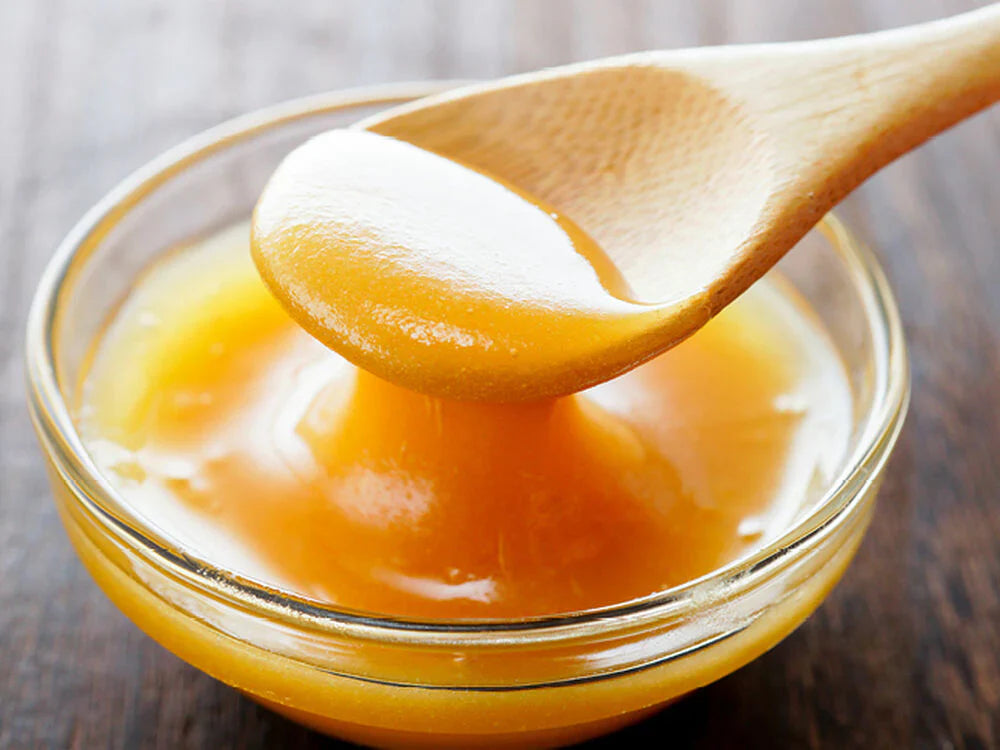
Manuka Honey MGO: The Ultimate Guide to Nature's Superfood
Share
Manuka honey is far more than just a sweet treat. Sourced from the pristine landscapes of New Zealand, this unique honey has captivated the wellness world, and for good reason. Its potent properties are what set it apart, and a key factor behind its power is a compound you'll often see on the label: MGO.
But what exactly is MGO, and why does its number matter? In this ultimate guide, we'll dive deep into the science behind Manuka honey's incredible benefits and help you choose the right one for your health and wellness goals.
What is MGO in Manuka Honey?
MGO stands for Methylglyoxal, a naturally occurring compound found in the nectar of the Manuka bush (Leptospermum scoparium). While other honeys contain some level of MGO, Manuka honey has it in concentrations up to 100 times higher, making it a true powerhouse.
The MGO rating you see on a jar—for example, MGO 250+ or MGO 550+—indicates the amount of Methylglyoxal in milligrams per kilogram of honey. The higher the number, the more potent and active the honey's properties. This makes the MGO rating a reliable and scientifically-backed way to determine the quality and strength of your Manuka honey.
The Science-Backed Benefits of MGO-Rich Manuka Honey
The potent MGO content in Manuka honey is what gives it its unique medicinal and therapeutic benefits. Here’s a closer look at what this incredible compound can do:
1. Powerful Antibacterial and Antimicrobial Action This is Manuka honey's most famous benefit. MGO is a highly effective antimicrobial agent that has been scientifically proven to combat a wide range of bacteria, including those that have developed resistance to antibiotics. This makes Manuka honey a natural tool for:
-
Wound Healing: Applied topically, Manuka honey creates a sterile, moist environment that promotes tissue regeneration and helps prevent infection in cuts, burns, and scrapes.
-
Sore Throats and Coughs: A spoonful of high-MGO Manuka honey can soothe an irritated throat and fight off the bacteria responsible for upper respiratory infections.
2. Supports Digestive and Gut Health Manuka honey is a fantastic addition to your diet for gut health. Its antibacterial properties can help combat harmful bacteria like H. pylori, which is often associated with gastric ulcers. At the same time, it can support a healthy gut microbiome by acting as a prebiotic, nourishing the good bacteria in your digestive system.
3. Anti-Inflammatory and Antioxidant Properties Chronic inflammation is a root cause of many health issues. Manuka honey's anti-inflammatory properties, combined with its high antioxidant content, can help reduce inflammation throughout the body. Antioxidants protect your cells from oxidative stress caused by free radicals, contributing to overall health and vitality.
4. A Natural Boost for Skin Health The benefits of Manuka honey aren't just for internal use. Its antibacterial and anti-inflammatory properties make it a star ingredient in skincare. It can be used as a face mask or spot treatment to help:
-
Fight Acne: MGO helps to kill the bacteria that cause breakouts.
-
Soothe and Hydrate: It’s a natural humectant, meaning it draws moisture into the skin, making it an excellent moisturizer for dry, irritated skin or conditions like eczema.
How to Choose the Right MGO Grade
Choosing the right Manuka honey depends on your intended use. Here’s a simple guide to help you decide:
-
MGO 100+ to 250+: Ideal for daily wellness, as a natural sweetener, or for general immune support. A great choice for adding to tea, smoothies, or spreading on toast.
-
MGO 250+ to 550+: A more potent option for targeted use. Excellent for boosting immunity during cold and flu season, soothing a sore throat, or for minor topical applications.
-
MGO 550+ and higher: These are considered high-strength, therapeutic-grade honeys. They are best for advanced health goals, such as intensive wound care, addressing specific digestive issues, or for a powerful immune boost.
Why Quality Matters
Not all Manuka honey is created equal. To ensure you're getting a genuine, high-quality product, always look for:
-
A certified MGO rating on the label.
-
The honey's origin—authentic Manuka honey comes from New Zealand.
-
Third-party testing to guarantee its purity and potency.
By understanding the power of MGO, you can make an informed choice and harness the full potential of this incredible natural superfood.
